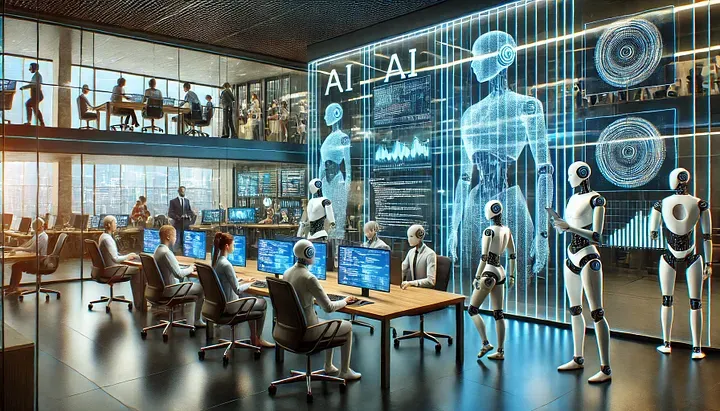Beyond the Hype of Artificial General Intelligence

This week’s post is also available as a podcast if you prefer to listen on the go or enjoy an audio format:
Artificial intelligence has transcended its theoretical origins in recent years to become an integral part of our daily lives. While AI systems excel at specific tasks, even surpassing human abilities in domains like chess, the emergence of generative AI has sparked intense discussions about artificial general intelligence (AGI). These conversations often drift into speculative territory, dwelling on potential existential threats that mirror science fiction narratives of AI dominance. However, this focus on hypothetical future scenarios diverts attention from the genuine challenges posed by current AI systems — particularly regarding their reliability, inherent biases, and ethical implementation.
The reliability of AI systems stands as one of the most critical challenges in the field. Generative AI models frequently experience what experts term “hallucinations” — instances where they generate convincing but entirely fabricated information. These aren’t merely minor inaccuracies; they represent fundamental flaws that can produce fictional content, from non-existent legal precedents to incorrect medical information. When these systems are deployed in crucial fields like healthcare, law, or criminal justice, the stakes become exceptionally high, where a single error could have devastating consequences. The pressing need to address these reliability issues becomes evident when considering AI’s growing role in high-stakes decision-making processes.
The bias problem runs deep within current AI systems, stemming from their training data — vast collections of information often harvested from the internet that mirror society’s existing prejudices and inequalities. These inherited biases can manifest in troubling ways, such as when criminal justice algorithms display racial prejudices that influence sentencing and parole decisions. Attempts to combat these biases through protective measures have achieved limited success and sometimes introduce new complications, highlighting the complex challenge of maintaining accuracy while eliminating prejudice. This persistent issue of bias raises ethical concerns and undermines the fundamental trustworthiness of AI systems, particularly in contexts requiring absolute fairness.
The economic impact of AI often generates misplaced fears about widespread job displacement. While the concern about replacing machines with human workers is understandable, this perspective must recognize AI’s potential as a productivity-enhancing tool rather than a replacement for human employees. The software development field provides a clear example where generative AI tools assist programmers in coding tasks, boosting efficiency without necessarily eliminating positions. The fundamental determinant of job displacement may lie more in the economics of AI implementation than in the technology’s capabilities. As affordable, open-source AI solutions become more prevalent, organizations might find more value in combining human expertise with AI assistance rather than pursuing full automation.
At the heart of these discussions lies a more profound philosophical question about the nature of intelligence itself. Human intelligence encompasses more than mere productive capacity — creativity, emotional understanding, and the ability to forge meaningful connections. These human qualities seem unlikely to be replicated by artificial systems, regardless of their sophistication. While AGI might eventually achieve something resembling human thought patterns and interactions, it still lacks the fundamental human characteristics that define our lived experience. This realization underscores the importance of maintaining perspective when considering AI’s potential impact.
The ongoing dialogue about AI and AGI remains vital, but we must not allow speculative concerns about future AI dominance to overshadow the tangible challenges presented by current systems. Instead of concerning ourselves with distant scenarios involving AGI, our priority should be addressing the immediate issues of reliability, bias, and ethical deployment. By focusing on these foundational problems, we can work toward a future where AI is a beneficial tool for humanity rather than a source of anxiety. This measured approach to AI development enables us to maximize its benefits while carefully navigating potential pitfalls, moving beyond sensationalism to achieve meaningful progress.
Thank you for being a part of this fascinating journey.
BearNetAI. From Bytes to Insights. AI Simplified.
BearNetAI is a proud member of the Association for the Advancement of Artificial Intelligence (AAAI), and a signatory to the Asilomar AI Principles, committed to the responsible and ethical development of artificial intelligence.
Categories: Artificial Intelligence Ethics, Technology and Society, Human-Machine Interaction, AI in the Workforce, Social Impact of Emerging Technologies
The following sources are cited as references used in research for this post:
Weapons of Math Destruction by Cathy O’Neil — explores bias in algorithms.
Superintelligence: Paths, Dangers, Strategies by Nick Bostrom — discusses the potential and risks of AGI.
You Look Like a Thing and I Love You by Janelle Shane — addresses the quirks and limitations of AI.
Artificial Unintelligence by Meredith Broussard — critiques the over-hyped promises of AI.
Algorithms of Oppression by Safiya Umoja Noble — examines bias in search engine algorithms.
Copyright 2024. BearNetAI LLC